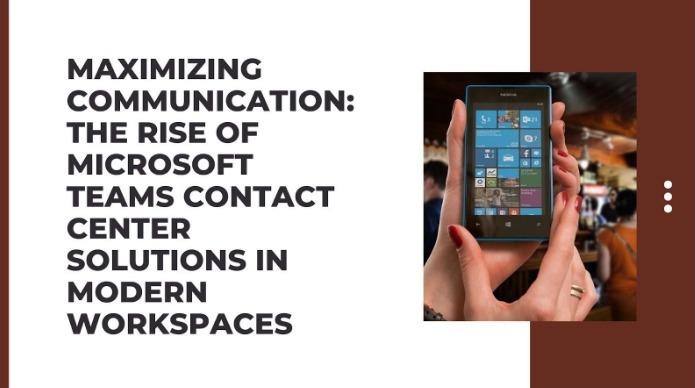The modern workplace is rapidly evolving. With remote and hybrid work models becoming mainstream, businesses must adapt their communication and collaboration strategies. Microsoft Teams has emerged as a pivotal tool to empower connection and productivity in decentralized work environments. This article explores how Microsoft Teams’ integrated contact center solutions are transforming customer engagement in the digital age.
The Evolution of Modern Workspaces
The traditional office setup is becoming a thing of the past. A 2020 PwC survey found that 83% of company executives planned to enable remote work. The implications are two-fold. Firstly, teams are now dispersed across locations. Additionally, customers now expect omnichannel service that meets their individual needs. Microsoft Teams empowers businesses to adapt to these new realities.
As employees are now spread across various locations, organizations require robust tools for effective communication and alignment. Microsoft Teams facilitates instant messaging, video conferencing, document collaboration, and more in one platform. Such capabilities are key drivers of productivity and employee engagement. A McKinsey study found that effective communication within remote teams can boost productivity by up to 25%.
Understanding Microsoft Teams as a Core Communication Tool
Source: DemandSage
Microsoft Teams is one of the fastest-growing business apps with over 250 million monthly active users globally. Its rapid adoption is due to a unique combination of features that facilitate modern teamwork.
Firstly, Microsoft Teams contact center solutions provide enterprise-grade security and compliance capabilities such as end-to-end encryption, data loss prevention, legal hold, and support for global regulations like GDPR and HIPAA. Organizations can collaborate securely.
Second, its global reach is unparalleled. Microsoft Teams supports over 90 languages and is available in 181 markets worldwide. This facilitates effective communication with colleagues and customers everywhere.
Furthermore, Microsoft Teams allows for seamless integration with other Microsoft 365 apps, including SharePoint, OneDrive, Outlook, and Office. This creates a unified workspace for team collaboration. Users can work together on documents, share files, schedule meetings, and more without switching between apps or losing context. According to a Forrester study, Microsoft Teams users gained 4 hours per week in productivity from improved collaboration through integrations.
Fourthly, Microsoft Teams facilitates human connections between colleagues through personalized profiles, private and group chat capabilities, gifs, and emojis. These features drive employee engagement across distributed teams.
Additionally, the platform boasts robust mobility through fully functional apps for iOS and Android. Colleagues can stay connected and collaborate on the go.
Together, these capabilities make Microsoft Teams the digital hub for teamwork in the modern workplace.
The Emergence of Contact Center Solutions in Teams
While Microsoft Teams delivers robust capabilities for internal teams, how does it fare for engaging external customers? Traditional telephony systems have limitations in the digital-first world. Calls remain siloed from other communication channels. Agents struggle to access customer history and tools across systems.
To address these gaps, Microsoft has seamlessly embedded Contact Center solutions within Teams. Within a single platform, agents can manage omnichannel customer inquiries, access CRM data, collaborate with specialists, and provide personalized experiences.
Contact Center solutions in Teams provide:
- Omnichannel Engagement: Integrate call, chat, SMS, social media, web chat, and more on a unified interface.
- CRM Integration: Surface customer data from Dynamics and other CRM systems for contextual interactions.
- Agent Experience: Optimized desktop, AI suggestions, knowledge-sharing tools, and omnichannel routing empower agents.
- Management Insights: Built-in analytics and dashboards provide visibility into critical KPIs.
- Security: Enterprise-grade security, compliance, and data encryption protect customer information.
This integrated experience within Teams streamlines communication and enhances productivity for contact center agents.
Benefits of Using Microsoft Teams for Contact Centers
Adopting Microsoft Teams Contact Center solutions allows organizations to revolutionize customer experiences and achieve superior business outcomes:
- Streamlined Communication
Unifying conversations across channels provides complete customer context in one view. Agents can quickly understand the intent and deliver personalized service through the customer’s preferred method. According to Microsoft, 35% of agents save 8-12 minutes per inquiry with omnichannel engagement in Teams.
- Enhanced Customer Service
Integrated CRM insights, KPI tracking, and real-time agent collaboration help organizations consistently deliver excellent service. Customers get quick resolutions without repeating information across agents. A study found that AI-assisted agents in Teams resolve requests 30% faster and significantly increase customer satisfaction.
- Improved Agent Productivity
Microsoft Teams Contact Center solution empowers agents with an intuitive desktop, automated suggestions based on machine learning, and tools to collaborate with subject matter experts. Agents become more productive over time. Five9 reports that optimized routing within Teams Contact Center has increased agent productivity by 23-38%.
- Seamless IT Experience
Since Contact Center solutions are natively built into Microsoft Teams, IT teams spend less time managing disparate tools. Tight integration with Active Directory and other Microsoft technologies also eases management overhead for IT administrators.
Real-World Impact: Case Studies
Global enterprises across industries are already transforming customer experiences with Microsoft Teams Contact Center solutions:
- Mercedes-Benz (Automotive): By switching to Teams Contact Center, Mercedes-Benz unified communications between customers, dealerships and internal experts. This enhanced customer satisfaction while improving agent productivity by 15-25%.
- Generali (Insurance): Generali revamped customer support with Contact Center solutions in Teams. Intelligent routing reduced call waiting times by 50%. Self-service interactions also doubled.
- Telstra (Telecom): Telstra empowered 9000+ customer service agents with Microsoft Teams. Unifying conversations enabled agents to deliver prompt, informed service. Customer satisfaction on calls increased 13 percentage points within 6 months.
These examples showcase the power of Microsoft Teams to streamline outreach, strengthen relationships, and exceed customer expectations.
The Road Ahead
The transformation of the workspace is accelerating. With the growing prevalence of remote and hybrid environments, Microsoft Teams will persist in enhancing its integrated contact center capabilities.
Upcoming opportunities include leveraging data and AI for smarter routing and automation, integrating emerging channels like social media and SMS, and providing an omniservisor experience. Microsoft also plans to enhance security and compliance features within Contact Center solutions.
Collectively, these innovations aim to enable businesses to optimize communication and revolutionize customer experiences via Microsoft Teams.
Frequently Asked Questions (FAQs)
How does Microsoft Teams ensure security and privacy for contact center data?
Microsoft Teams Contact Center solutions provide enterprise-grade protection with 256-bit encryption, role-based access control, and SOC-2 compliance. Customer data is kept secure and private.
Can you integrate third-party apps with Contact Center in Microsoft Teams?
Yes, Microsoft Teams enables custom integrations with other apps through webhooks and APIs. This allows businesses to connect essential tools like payment systems, databases, ERP systems, and more.
What is the total cost of ownership for Microsoft Teams Contact Center solutions?
Pricing is customized based on the number of agents, communication channels, and specific capabilities needed. When considering the benefits of simplified IT management and increased productivity, the overall TCO is competitive. Contact Microsoft for an accurate cost estimate.
Final Takeaway and Conclusion
Modern workspaces demand agile communication strategies. Microsoft Teams uniquely positions businesses to engage customers and connect colleagues across the digital-first world. Its embedded contact center solutions help unify conversations, enhance service, and build deeper relationships. Microsoft Teams equips organizations to enhance communication and unlock unprecedented productivity for the future of work.
Author



